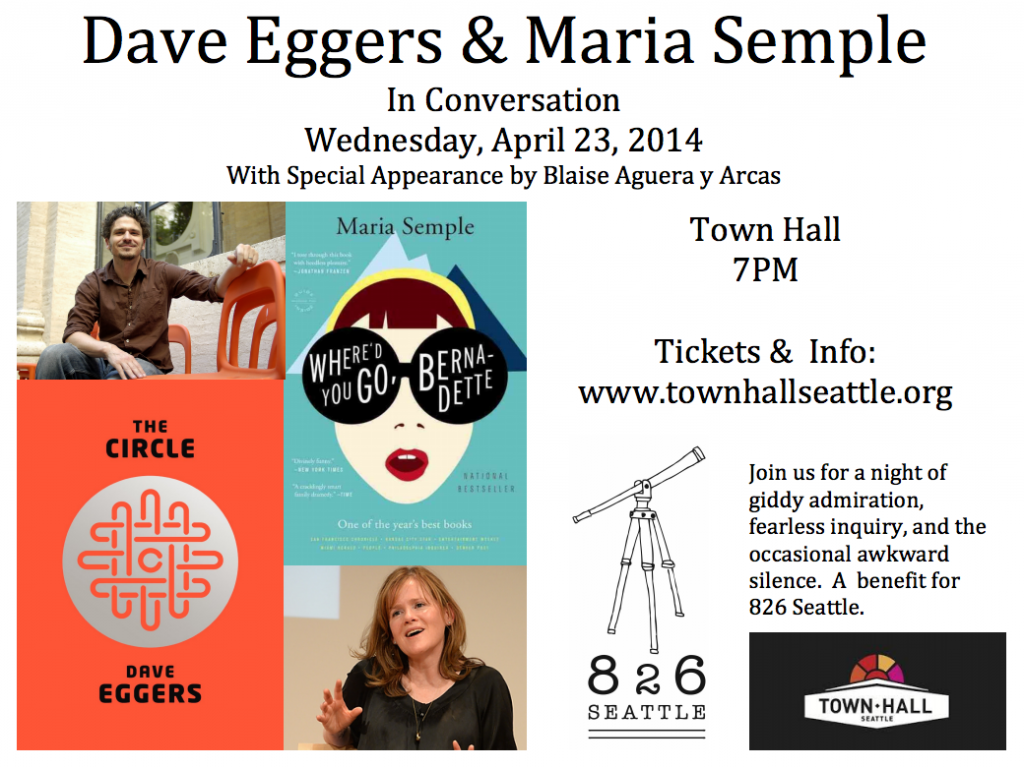Hey, I made it onto Slog last week! Exciting, since this is pretty much my main source of news. I think life wouldn’t be so bad if The Stranger really were the English-speaking world’s only newspaper.
Christopher Frizzelle did this short interview with me in advance of my “special appearance”. I’m copying some of it here in case, you know, the authorities raid The Stranger’s offices, find the drugs, and shut down their Internet operations–
In Dave Eggers’s novel The Circle, images uploaded by regular people through social media become terrifying surveillance tools—creating a total loss of privacy worldwide. Is it possible that innocuous, personal images like that—me and my mom at the beach, say—can be mined for data to such terrifying ends?
The Circle envisions a lot of scenarios far beyond photo sharing. The sinister “closing of the circle” involves a total destruction of privacy by means including mandatory sign-up of the whole population using real names, embedding of tracking chips in the human body, radical public self-quantification, and ubiquitous realtime cameras streaming high-definition video from everywhere on Earth. So no, a few photos of you and your mom on the beach posted to a social media site are probably about as innocuous as they sound.
Of course, given that the web empowers us all to be publishers with global reach, we have new social responsibilities. Abuses of these responsibilities have created the potential for harm to oneself or to others. I’m thinking of revenge porn and online bullying.
Social media aside, I personally think privacy in the online era is a very real concern—especially given the many benefits of using the Internet and the cloud to store and transmit personal data. Pretty much all of us do this—it’s enormously empowering and convenient. Remember what life was like before email or messaging, and when photos lived in shoeboxes or, even worse, on those external hard drives that tend to no longer work when left on the shelf for a few years? So I think it’s very important for us to have an Internet we can trust with our stuff, without worrying that the government is surveilling it without a warrant. That’s one of the reasons I’ve found the Snowden leaks so upsetting, and why I believe we need strong Fourth Amendment-like protections for our private data, whether offline or online.
Reading The Circle made me terrified of the future. What was your reaction?
I’m a cautious optimist, and I see it as my job to do what I can to influence the future positively and mindfully. I don’t believe in a zero-sum worldview in which we must choose between privacy and self-quantification, for example, or between introspection and social behavior. I think that well-made technology can empower us to be more human, not less.
I listen and read a lot. I picked up a copy of The Circle back when it first came out not only because Dave Eggers is a brilliant writer, but also because I think he’s an important thinker. Those of us who are engineering new technology should look closely at both utopian and dystopian futures. We should understand something about the bright and dark spots of our history too—these are powerful inoculants. By avoiding the blithe ahistoricism and anti-intellectualism of characters like Mae in The Circle, or Eunice Park in Gary Shteyngart’s Super Sad True Love Story, we can avoid making some of the obvious mistakes.
Maria Semple has said you were the inspiration for the TED-talking, Microsoft-genius dad in her book Where’d You Go, Bernadette. What did you think of Where’d You Go, Bernadette? What was it like to read about a character loosely based on you?
Of course it was really fun! Maria seemed a little apprehensive about this when she sent the advance copy. But Elgie and I are only similar in some very broad outlines. The character is developed purely to serve the story’s ends; she didn’t set out to make a portrait of me. So while it was a funny shock to read those few semi-biographical sentences, the feeling wore off quickly as the story picked up. I loved the book, and posted a review on my blog. It’s timely, well-written, scorchingly funny, and ultimately packs quite a punch. I kind of knew it would go big.

